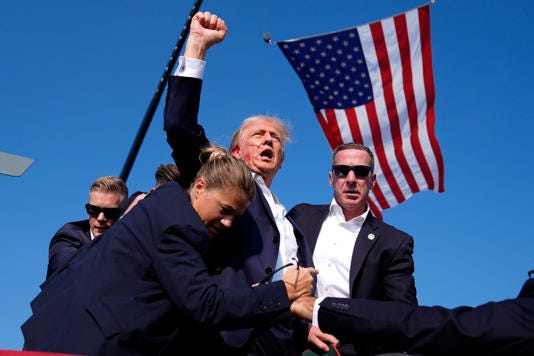My latest article is over at The Dispatch. Click through to read the whole thing, but here’s a taste:
The shocking attempt on Donald Trump’s life this weekend has prompted comparisons to similar attacks on past U.S. presidents. Trump’s defiant, bloodstained fist pump is perhaps closest in visual form to the moment in 1912 that Teddy Roosevelt took a bullet in the chest yet still finished his stump speech. Others have pointed to John F. Kennedy’s assassination in 1963; indeed, it seems likely that the instantly iconic photo of Trump will live alongside the famous picture of Jackie Kennedy on the back of the presidential limousine in our collective cultural memory.
Yet as a historian of 20th century American politics, I think that the nearest historical corollary to our current moment actually happened seven months prior to JFK’s death in Dealey Plaza. In April 1963, Lee Harvey Oswald—yes, that Oswald—aimed his mail-order rifle through the kitchen window of another presidential candidate, only to have the bullet ricochet off the window frame and slightly wound the intended victim. That both Trump and Oswald’s victim were slightly wounded by missed rifle shots is only the first, and most superficial, parallel.
It is the political environment that served as a backdrop to that shooting in the spring of 1963 which bears a surprisingly close resemblance to today. Although these two shootings are separated by six decades, the hyperpolarization and paranoid rhetoric that propelled them both will only increase the risk of ongoing, targeted political violence in the near future.
Oswald’s target on that April night was former Army Gen. Edwin Walker, a conservative independent candidate considering a run for president. Just two years earlier, Walker—a decorated Korean War ranger—had been cashiered for promoting right-wing training materials that alleged communists had infiltrated the government and journalism. Walker blamed President Kennedy and decided a political career would be the best revenge; he sought to build a coalition out of Southern segregationists and Christian right activists like the Rev. Billy James Hargis, an Oklahoma preacher with millions of radio listeners.



